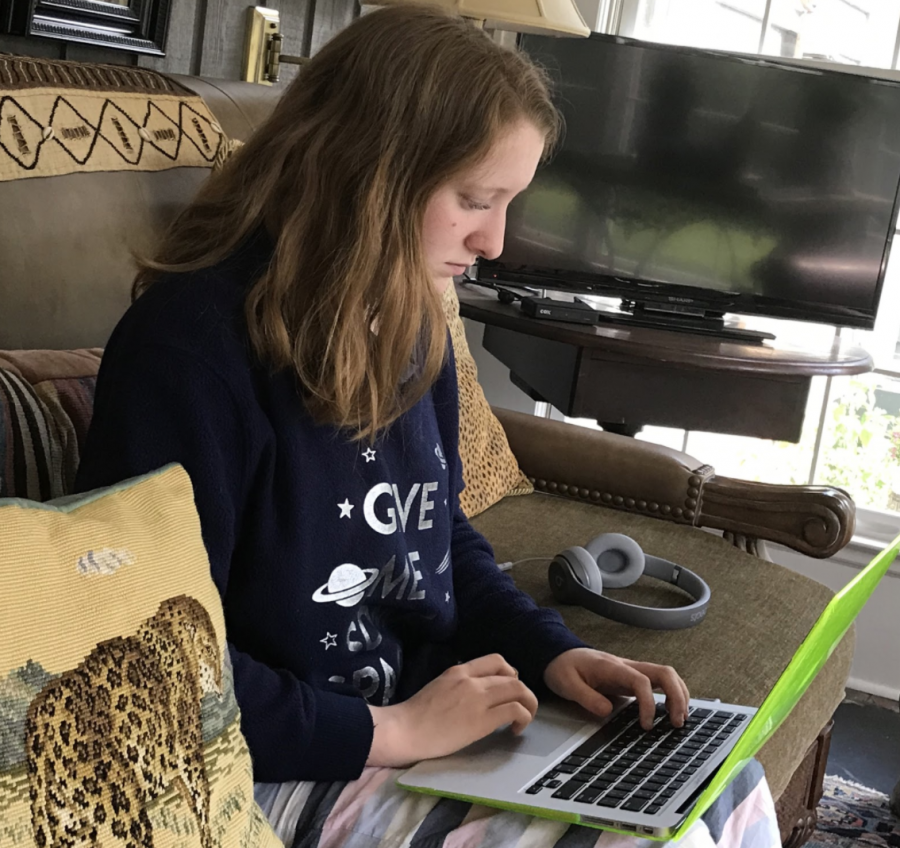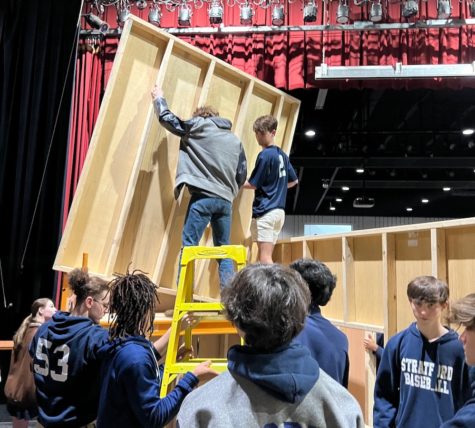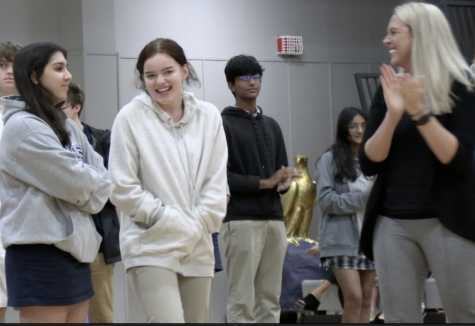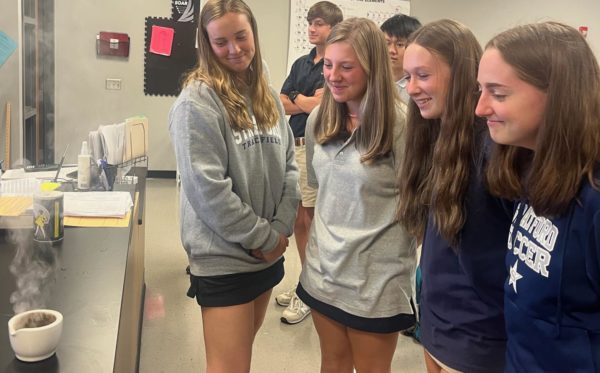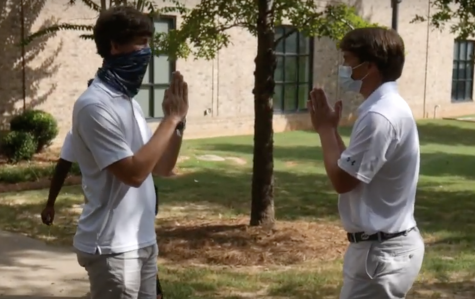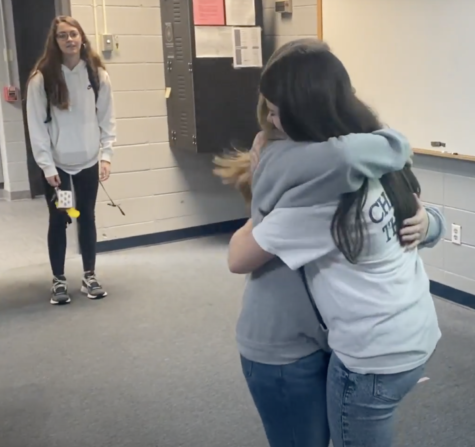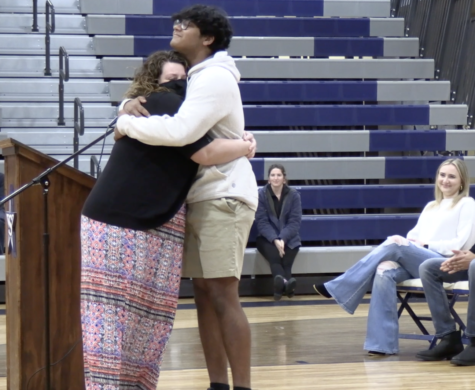Students, faculty adjust to ‘distance learning’
Teachers have been ‘amazing’, students have been ‘beautifully responsive and responsible’
Gazebo Photo by Mimi Rader
Junior Gabrielle Rader works on assignments from home
Head of Upper School Mrs. Theresa Ferrari said she is proud of how the Stratford family has handled Distance Learning.
“Upper school teachers have been amazing in their efforts to keep students on task and learning,” she said. “For the most part, the students have been beautifully responsive and responsible.”
Of course, the new system has brought challenges, too. Mrs. Ferrari has been answering emails and phone calls nonstop since school’s been out.
“While I’m on a call or email with a student, or teacher, another call or email rings in,” she said.
Some students have gotten confused on how to turn assignments and due dates.
Scheduling conferences have been canceled this year. Advisors will have until April 10 to confirm schedules with all their students. It has not yet been decided how parents will sign off on students’ schedules.
The pandemic not only has cancelled school through April 24 but also SAT and ACT dates and changed AP exams. There will not be a March or May SAT. There will be no April ACT. Students who had registered to take the test will be refunded and will need to sign up for the SAT or ACT in June.
I am trying not to overwhelm them, but I still expect them to take the class seriously and learn as much as they can.
— Ms. Taylor Neville
AP exams now will take place online at home and will only last 45 minutes. All questions will be free-response. The last units of each AP class will not be included on the exam. The College Board promises more information about the format of the exams on April 3.
Despite the changes and adaptations, there have been positive aspects for teachers.
“I am trying not to overwhelm them, but I still expect them to take the class seriously and learn as much as they can,” math teacher Ms. Taylor Neville said.
Mrs. Neville said her teaching has not changed much from in-class to online. She records lecture videos for her students in the same way she teaches in class. However, she does not like the fact that she can’t answer her students’ questions.
Another struggle she faces with this transition is how she used to have 45 minutes for each period, and now she receives emails with questions and assignments throughout the day.
Despite these difficulties, she likes seeing most of their students completing work on time and not in her classroom for the entire class time. Students usually turn in notes taken from her lectures and meet with her on Zoom every two or three days to go over the material.
Since social distancing is the goal of Stratford’s closure, everyone is expected to stay home. For this reason, Ms.Neville is able to spend more time with her young daughter at home.
Even though students are doing online school, Ms.Neville still assigns tests or quizzes where students show their work to make sure they put in the effort and don’t just look for answers.
If school does not reopen soon, she will try to find a way to assign tests and quizzes online to facilitate the process.
Another change are grades. They still work like they used to, yet there are daily “attendance” grades from turning in assignments every day. Many teachers are also grading students this way.
In her classes, students have less work now. Her lectures are shorter, around 20-30 minutes, which means they don’t take an entire period and students only have to answer a couple of comprehension questions.
Science teacher Mr. Luke Harrington is having to take some time to adjust to distance learning as well. Even though it has taken some time, Mr. Harrington said he is “impressed with how everyone has worked together to make it as productive as possible.”
Even though all of the teachers would rather be in the classrooms, face to face with their students, he said, “I believe we are making the very best out of a challenging situation.”
Along with high school teachers, middle school teachers are feeling the same way about distance learning. Mrs. Donna Ellison feels that going into distance learning, that she was not prepared for how the students would learn to their best abilities.
“It took me a good couple of lessons to get into the routine to feel confident in teaching online,” she said.
Mrs. Ellison’s daughter, Abby Ellison, recently was interviewed by 13WMAZ about the new online school.
Some teachers enjoy different aspects of Distance Learning.
Science teacher Ms. Kinsey Peterson enjoys being able to not wear work clothes now, but misses her students and the faculty. “It makes discussions, projects, notes, lab, etc. everything much more difficult,” she said.
Making lesson plans everyday has become much more time consuming for Stratford’s faculty. English teacher Ms. April Bacon likes learning new online tools that she can use now and in the future during the period of Distance Learning. But she misses the daily contact and conversations with her students.
“I miss those “five minutes before class” conversations my students have, during which they chat about their lives, practice their Tik Tok dances, and react to the previous night’s reading” she said.
Mrs. Patsy Hayslip has been the director of the Stratford LSC for 45 years. She said she is not a fan of distance learning. She said she is “hands on, and [now] missing [her] students.” She loves her job and it has been challenging to do her job through distance learning. Mrs. Hayslip says that she is “sticking with what [she knows] best such as emailing and texting and some FaceTime.” She is in the process of figuring out Zoom.
Her main concern is for her students. Since everything has changed so quickly, she deals with uncertainty and disappointment daily. Mrs. Hayslip is happy to see “that Stratford students are rising to the occasion as they always do!” She is “so proud of [her] students and the friends [she has] made at Stratford in 33 years,” and “especially the extraordinary ladies in the LSC.”
Mrs. Hayslip also has expressed how fortunate Stratford is as a school to have the “administrative team of Mr. Logan Bowlds and three principals who have all stepped into new positions this year.”
Online learning is not new to all students. Freshman Elinor Fenimore was home schooled from 4K to sixth grade, before enrolling at Stratford in seventh grade. She enjoyed being home schooled because she could hang out with her brother and sister and do activities she enjoys.
“It was much easier to do the things I enjoyed like dance and theater because my energy wasn’t as drained,” Elinor said. “I also had super cool opportunities like working as a standardized patient at the Mercer Medical School and being an extra in a few movies in Atlanta.”
I like to space out my assignments just so I don’t have to sit in one spot for numerous hours. Just so I can give my brain a break every now and then. — George Seagraves
Compared to Stratford’s Distance Learning program, home schooling is similar because students can make their own schedules.
“It is different because my mom was my only teacher so I didn’t have to do online video class or communicate with other teachers through email,” Elinor said. Elinor also didn’t have certain dates and times assignments were due, so it was easier to get behind.
Overall, students have a variety of reactions to distance learning. Social distancing does have some students missing school due to their lack of face-to-face social interaction.
“I miss my friends and just seeing people in general,” freshman Blain Caldwell said.
“Distance learning has been very different, but I have enjoyed it so far. It’s nice to be able to do work from and sleep in,” freshman Anna Thompson said.
Junior George Seagraves said he had get into a rhythm each day, but has made the adjustment.
“It’s strange at first, but once you get used to it, it’s not that bad,” he said.
He said he appreciates being able to ask his teachers questions over video chat. “It’s a lot of self-motivation just to tell yourself to get up and get your work done,” he said.
George also has used time management to distribute his school workload.
“I like to space out my assignments just so I don’t have to sit in one spot for numerous hours,” George said. “Just so I can give my brain a break every now and then.”
Sabina Ajjan —or Sabean, as denominated by her friends— is a junior. This is her fourth year at Stratford and her third year on The Gazebo staff where...

NAME: Annie Shih
GRADE: Senior
SCHOOL ACTIVITIES: Soccer, DEI Alliance, Drama Club, Beta Club, Spanish Club, Chess Club
FAVORITE SUBJECT: Chemistry
FAVORITE...

GRADE: Junior
SCHOOL ACTIVITIES:Swimming, cheer, key club, pep club
HOBBIES/INTERESTS: Watching Netflix and swimming
FAVORITE COLOR:...

GRADE: Senior
SCHOOL ACTIVITIES: Journalism, Drama Club, Pep Club, Latin Club, and French Club.
HOBBIES/INTERESTS: Fashion, shopping, style, hanging...
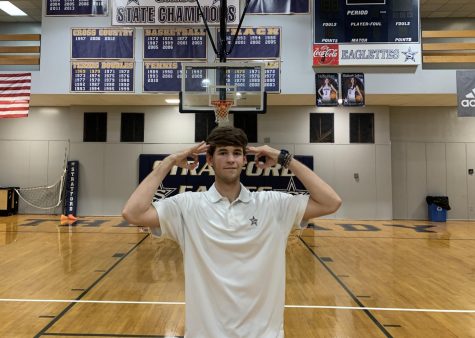
NAME: Jack Medlin
STAFF POSITION: Co-Sports Editor
GRADE: 12th
SCHOOL ACTIVITIES: Shooting Team, Basketball, Baseball, and Pep Club
HOBBIES/INTERESTS:...

GRADE: Senior
SCHOOL ACTIVITIES: VP of the Food Drive, Beta Club, Pep Club President, Lacrosse
HOBBIES/INTERESTS: reading, sleeping
FAVORITE...

Annabeth Tarbutton is a freshman and has been at Stratford for two years. This is her first year as a staff writer for the Stratford Gazebo. She has two...
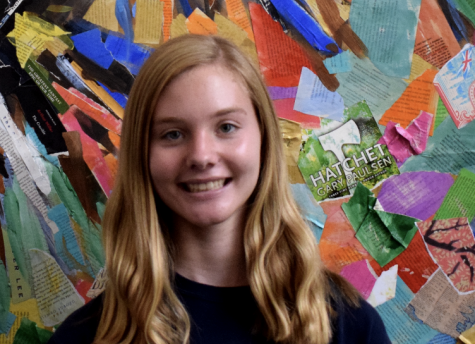
Edie Sharpton is a freshman staff writer in her first year in Gazebo. She has been attending Stratford Academy for 11 years. She has a younger brother,...

NAME: Mimi Rader
STAFF POSITION: Staff Writer
GRADE: Senior
SCHOOL ACTIVITIES: I enjoy participating in drama club, marching band, and spanish...



